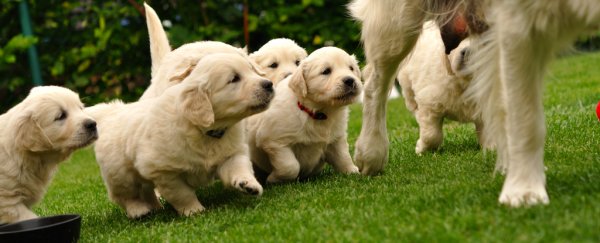Becoming a guide dog is hard. Not all pups have what it takes to navigate complex landscapes without pausing for hydrants, dog-butts, and taunting cats.
New research adds support to what many trainers might have already suspected – puppies that receive less attention from mum are more likely to graduate guide dog training.
Guide dogs need to work as a team with a visually impaired human, piloting them around obstacles under strict directions from their owner. This requires not only intelligence, but a lot of confidence and adaptability.
A team of researchers in the US tracked 98 young dogs from birth to adulthood as they were put through their paces at a guide dog breeding and training program in New Jersey.
About 30 percent of dogs tend to fail the course, usually because of their poor problem solving skills, lack of perseverance, or anxiety when confronted by something out of the ordinary.
This failure rate doesn't come cheap, either. It costs around AU$30,000 (or roughly US$50,000) to train a guide dog, which in places like Australia is funded by a mix of donations and government support. In the US, it's all down to fundraising.
The researchers wanted to know if there were early indications of which puppies were most likely to drop out, and which would successfully make it through to graduation.
In what has to be one of the toughest science experiments around, the researchers sat and arduously watched 115 hours of video featuring 21 litters of puppies interacting with their mothers.
They then came back when the pups had grown into young adults and ran them through a battery of 11 tests to score them according to different skills in problem solving and self-control.
Lastly, they matched their results with whether they successfully completed the guide dog course at age 2 ½.
In the end, 66 of the 98 candidates had the grit and smarts to be a good guide dog.
The pups generally performed better at tests that required them to solve a problem for a treat, or who resisted barking when confronted with a toy cat.
They had something else in common – for most of them, time in the litter wasn't exactly easy-street.
The researchers found that the more time the mother spent 'coddling' her litter, the more likely it was they'd fail to make the grade. This includes lying down to give her pups a feed, time spent nursing them, and the amount of attention given through licking and touching.
"More intense mothering early in life was associated with program failure," the researchers state in their report.
"In addition, mothers whose nursing style required greater effort by puppies produced more successful offspring."
The relationship hints strongly at the role a mother's behaviour plays in determining the cognitive and social abilities of her young. A little stress, it seems, could give the growing pups the edge over their peers.
It's important to note that studies such as these can make it hard to distinguish genetics from the influence of their mother.
"Because all mothers were related to the puppies they were rearing, we are unable to determine a precise causal link between maternal style and later puppy behavior and outcome," the researchers note in their report.
Breeding dogs are selected from the best pedigree lines, so we're not talking back-alley mixes here. In this particular case, the dogs were from proven families of German shepherds, Labrador retrievers, and golden retrievers.
That means we can have some confidence that any significant differences in their behaviour as adults derives from experiences they had as pups.
Either way, finding a way to repeat the study using foster parents would help clarify just how big a role the mother's actions played in her offspring's temperament.
Given the range of complexities involved in picking the right dogs for training, it's unlikely that a single study such as this will radically affect how guide dog training programs manage their students.
In the meantime, the research gives a nod to the view that it takes the right balance of cuddles and tough love to raise a kid with the skills to be able to cope with life's challenges.
This research was published in PNAS.
